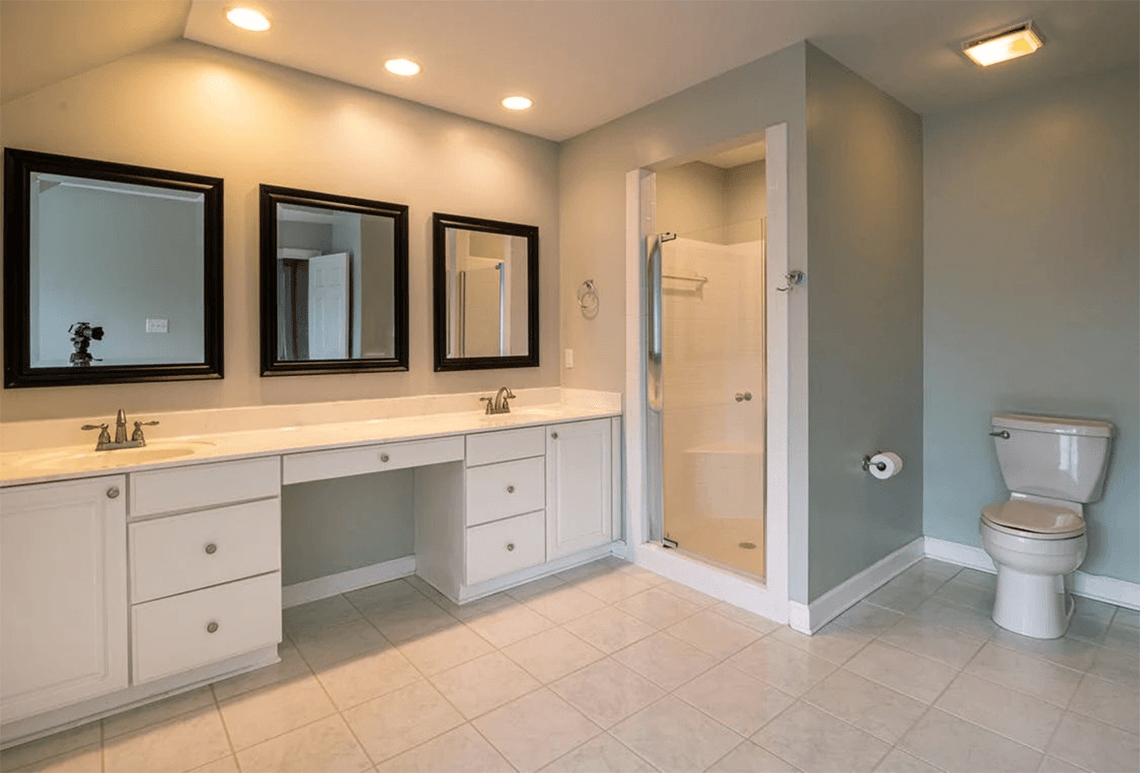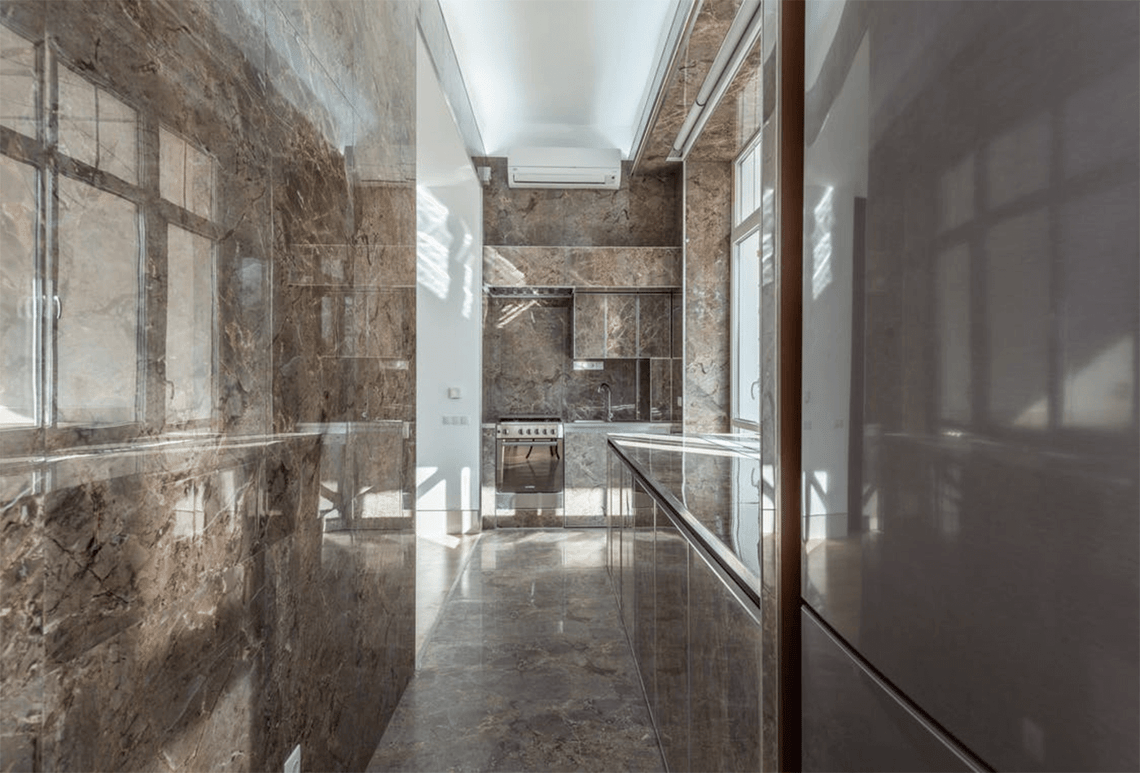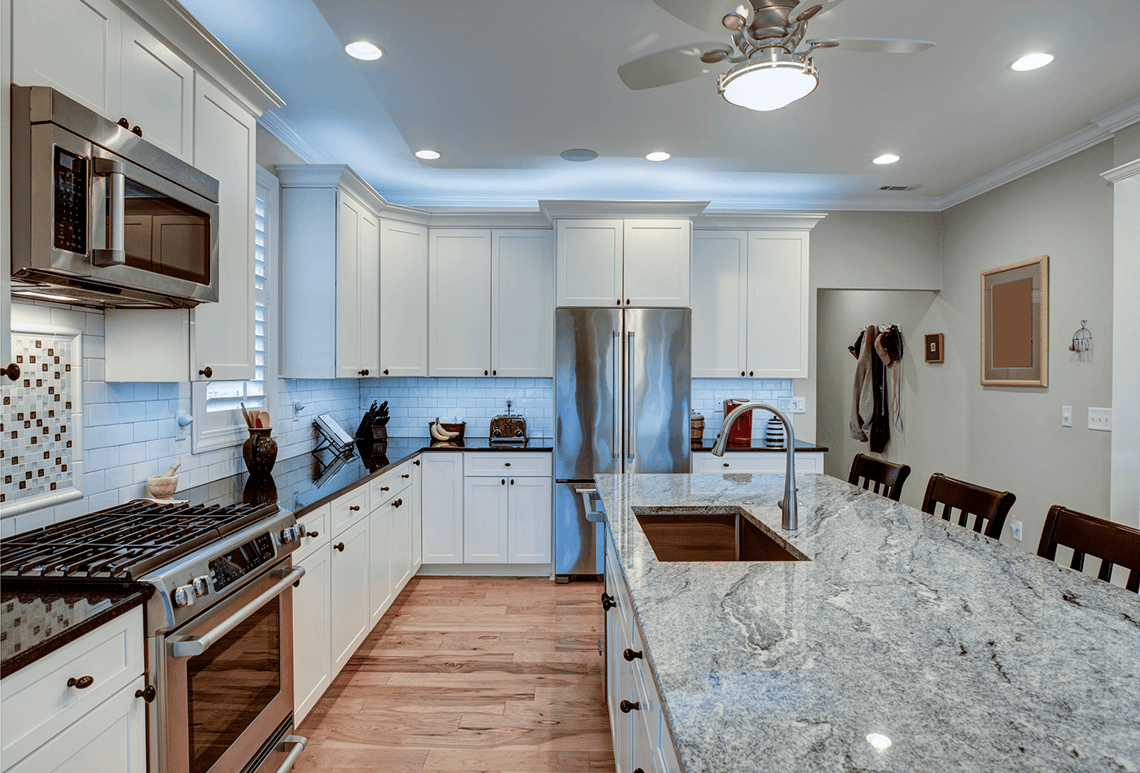Travertine is a natural stone which is one of the most widely utilised stones for building materials due to its durability, marble-like texture and appealing earthy colours.
Popular Travertine Quarries:

Historically, the Italian Alps provided much of the travertine used in buildings and artwork; however, today, the majority of travertine marketed comes from Turkey, Iran, Mexico, and Peru. The most significant quarries from Ancient Roman times can be found in Tivoli and Guidonia Montecelio, two well-known travertine quarries in Italy. The travertine from the Tivoli quarries was used to construct the renowned Colonnade of St.
Travertine Tiles
As a popular wall and flooring material, travertine tiles are created from travertine slabs. Travertine is frequently offered as tiles and is available in a range of earth tones, including tans, browns, rust, and beige shades. Travertine is highly heavy and needs to have its surface sealed frequently while being a very durable stone that is easier to maintain than some other varieties of natural stone. Travertine flooring can provide a distinct combination of mountainous beauty to interior spaces, while it is not suitable for all settings.
LYDIA CLASSICO TRAVERTINE TILES
£34.50 Lydia Classico Travertine Tiles are light-coloured stones in a beige-cream shade.Lydia Classico Travertine Tiles look good in a traditional as well as modern setting. They can be used indoors and outdoors. In the Lydia Classico series, which is a well-liked… read more |
LYDIA CLASSICO CHISELLED EDGE TRAVERTINE TILES
£45.00 Lydia Classico Chiselled Edge Travertine Tiles are light-coloured stone in beige-cream shade. Even though the base colour of these Chiselled Edge Travertine Tiles is the same as that of the Lydia Classico tumbled tiles, they are more reasonably priced and… read more |
ROMAN CLASSIC & FILLED TRAVERTINE TILES
£28.50 Roman Classic and Filled Travertine Tiles feature a soft spectrum of natural beige and white. The beige-coloured background is adorned by multiple thin white veins in random order. These travertine tiles enhance the traditional feel of your indoor spaces or… read more |
Pros and Cons of Travertine
Is Travertine Very Expensive than Granite?
Both granite and travertine are premium-grade natural stones. Per square foot, travertine typically costs £256 to £500 in average. Compared to granite and marble, travertine tiles cost roughly 3% less per square foot.
Is Travertine an Affordable Flooring Solution?
Travertine is a high-end flooring material overall while being a mid-range stone in terms of price. The approximate cost of a travertine floor, including labour and supplies, is £45 per square foot. Granite costs about £70 per square foot on average, whereas marble often costs around £75. The least expensive of all flooring options, laminate flooring may be professionally laid for less than £15 per square foot. However, largely depending on the quality and texture of the stone, travertine flooring can cost anywhere from £45 to £60 per square foot, just like other natural stones.
SILVER TRAVERTINE TILES
£55.50 Silver Travertine Tiles display various hues of silver and grey. They are fantastic and durable tiles that make a space statement when installed. These Silver Tiles depict natural colour and pattern variations from tile to tile, making them very attractive… read more |
SIVA NOCE TRAVERTINE TILES
£39.00 Siva Noce Travertine Tiles display various hues of coffee brown from light to dark, that can add depth and character to any space. They are fantastic and durable tiles that make a space statement when installed. These tiles depict natural… read more |
LYDIA ANTIQUE TRAVERTINE TILES
£36.00 Lydia Antique Travertine Tiles are beige-cream in colour. Even though the base colour of these tumbled travertine tiles is the same as that of the Lydia Classico tumbled tiles, they are more reasonably priced and have a more pitted appearance.Finish:… read more |
Finishes of Travertine Slabs

Work-tops offers travertine slabs in a variety of finishes, including honed, tumbled, polished, brushed, and chiselled edges, bush-hammered, and leathered.
The most popular ones are explained below:
Polished: Tiles in this category are particularly shiny because the stone has been fully sealed and polished to the smoothest possible finish. This is the finest option for stain resistance, however, when wet, it is highly slippery.
Honed: Honed travertine has been lightly filled and polished, but it still has a matte-like appearance and is less slick and slippery than polished stone. For usage as flooring inside, this stone is the most common.
Tumbled: Travertine that has been tumbled has rounded corners and edges and an aged, antique appearance. It has high traction but needs to be treated to prevent stains. Although it has a lovely antique appearance, it is not a very practical flooring option.
Brushed: To give the stone a matte finish, travertine is textured by being treated with wire brushes.
Is Travertine Floor Good for Winter?
Travertine flooring has a tendency to maintain its temperature, staying cold in the winter and warm late into the evening like other solid-stone surfaces. On chilly mornings, walking barefoot on the floor might be uncomfortable. Area rugs positioned in the right spots will help to minimise this issue. Travertine tiles are also a fantastic choice for in-floor heating systems. Once the tile has heated up, it becomes a superb conductor that will gradually warm up a space.
Are Travertine Floors Suitable for Kitchens?
Travertine tiles are a wonderful alternative for kitchen floors since they are so much easier to maintain than other materials. Regular sealing keeps stains from being left on the tiles by frequent kitchen blunders like food and water.
What Kitchen Countertops Go with Travertine Floors?

A calmer grey or white granite or quartz countertop, like our Colonial White Material, may go nicely with busy travertine tile floors. If you choose a glossy, smooth tile, we advise selecting a solid surface or quartz worktop material with a similar colour and texture.
Do Travertine Countertops Stain?
Although etching and staining can happen to travertine, you can typically stop them by sealing the surface.
Does Travertine Crack Easily?
Due to its resistance to moisture and humidity, travertine tiles are particularly long-lasting. Just taking good care of them and maintaining them properly is all that is required. If you handle them carefully, they won't break easily.
Does Travertine Need Sealing?
Travertine does require to be sealed in order to preserve its natural beauty and prevent permanent stains from occurring from liquids like red wine.
Travertine Maintenance

Travertine maintenance is ironically both challenging and easy. The small holes in travertine, like those in other natural stones, can let spilt liquids and staining substances seep through. The application of a penetrating sealer, followed by the application of a barrier surface sealer, will solve this issue. It is necessary to apply this dual treatment during installation and to reapply it sometimes for the duration of the floor's life. More frequent resealing will be required if you want to keep your surface shiny. Travertine is relatively easy to maintain, requiring simply a quick damp mopping with a light soap solution if it is kept accurately sealed.
Don’ts of Travertine Cleaning
Vinegar and acidic cleaners shouldn't be used. Avoid using them in the name of a "green" substitute. These products' acidic properties have the potential to wear away at the travertine stone's surface over time and dull the finish.
Check out our stone gallery if you are looking for renovations. Email info@work-tops.com to book your stone as well as give customised preferences.
P.s. The readers are informed that none of the content available on any of the pages of Work-tops.com should be taken as legal advice and that Work-tops will not be held accountable for your use of the information contained in or linked from these web pages.




